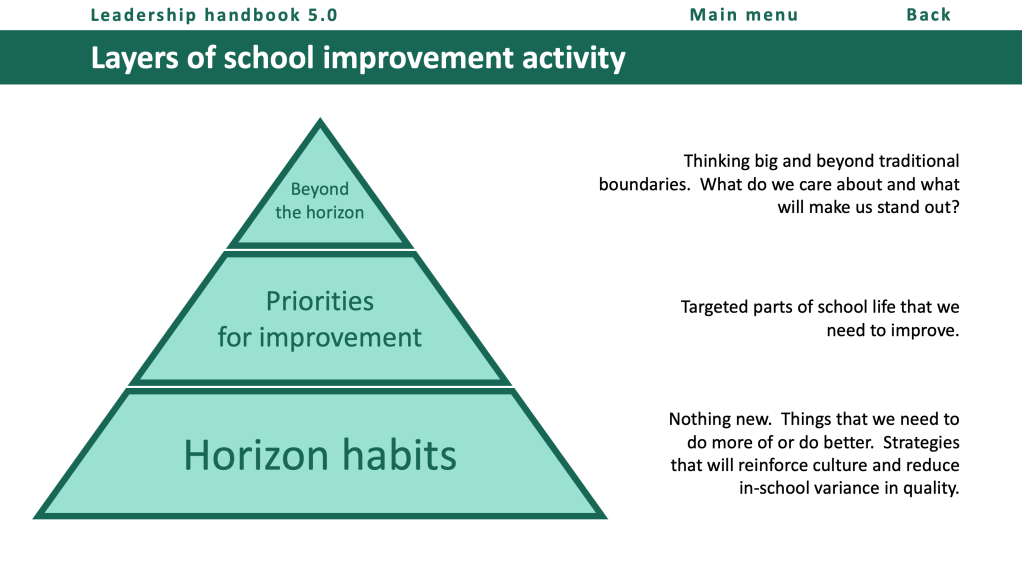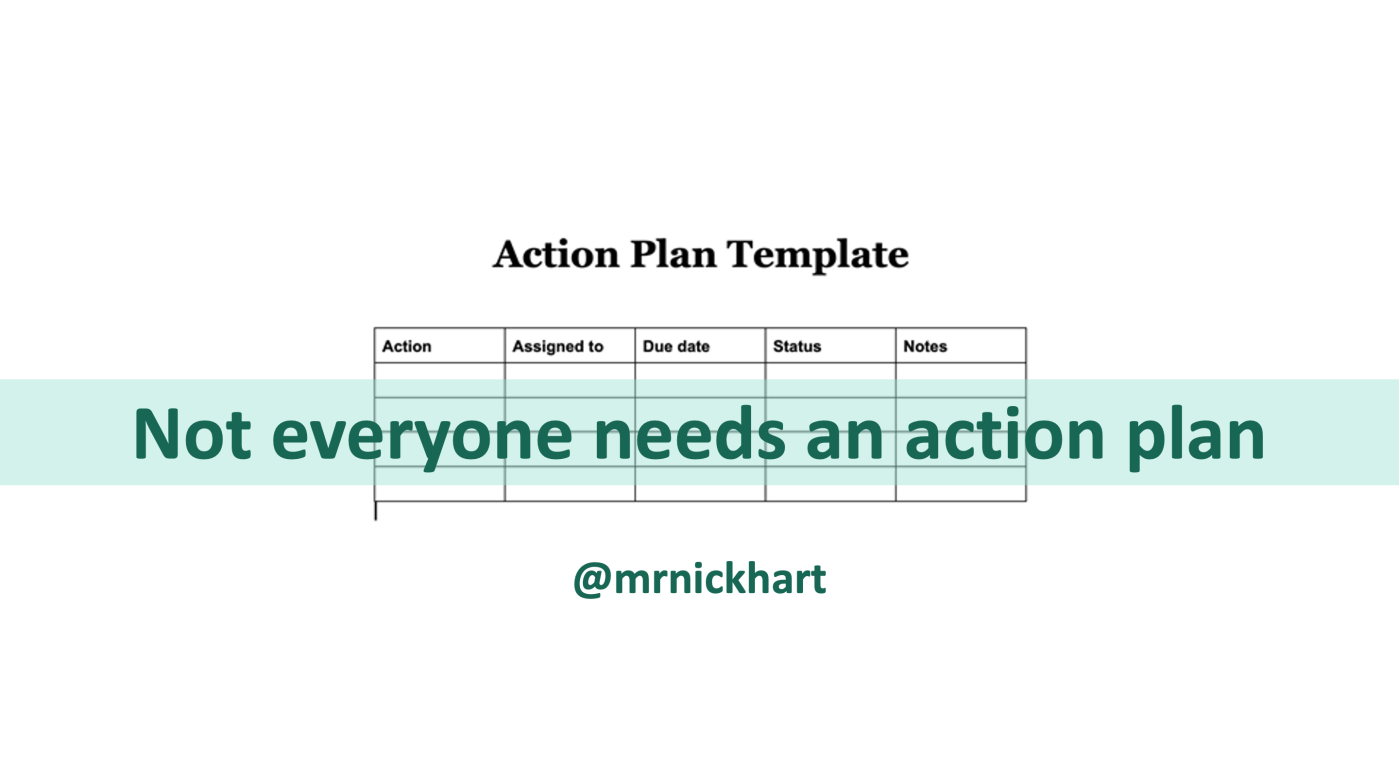
In a previous post I elaborated on this model for school improvement that conceives of leaders’ work at three levels. The question ‘What do we do?’ is one of several questions that school leaders should think about and have well formed responses to in order to set the long term strategic direction of the school.
A subsequent post looked at the base layer of school improvement activity in a little more detail, explaining the kind of things that we might do when working at this level:
- Know it better
- Nothing new
- Coherence, not consistency
- Seek efficiencies and remove barriers
- Trust, but…
And, most recently, I explained the work in the middle layer of school improvement activity, the ways in which we might be able to enact an improvement plan whilst acknowledging the complexity of school life.
This post explores the work at the base and top layer in a bit more detail.
Horizon habits
We’ve termed them Horizon habits at our school and the point to remember is that at this level of school improvement activity, we’re deliberately not doing anything new. We’ll have established ways of working that we want to ensure are more universally understood and implemented. We’ll be using these ideas to address any within-school variance in the quality of teaching, or in curriculum design, or in pastoral processes. But remember this is not with the aim of making everyone do the same thing. Coherence (usually) is far more important than consistency.

Sure, there are times when consistency is more important, for example we probably need consistent responses to safeguarding concerns or for how we track attendance each day but when it comes to leadership of education, where we are solving the problems of teaching that are demonstrably different if we’re teaching 3 year olds or 11 year olds, or whether we’re teaching English or art, coherence to a set of principles trumps consistency of practice.
We don’t always need an action plan
So what are leaders to do when working at this layer? Write an action plan? I’d argue not. I’d argue that action planning is the artifact of the school improvement layer and that systems and processes are far more important artifacts at the habit layer:

Although I think we might disagree on what a system is, I’m all for Clear’s underlying message and the artifact that is most useful for working at the habit layer is a timeline that helps a leader to organise and prioritise. Let’s look at an example for a Head of Year.
What needs to be prioritised?
Well, first it is the day to day running of the year group. I think we need to prioritise collaboration for a very important reason and that is that most teacher learning is informal, happening as we go about our day to day work. Not in formal courses or twilight INSET sessions but in conversation with each other. So, we’re prioritiing collabiration but by what means? What are the cultural artifacts of collaboration that we might prioritise?
- Planning meetings
- Team teaching
- Self review
Planning meetings
Planning meetings are the bread and butter of multi teacher teams. We share the planning load not only to reduce workload but to benefit from others’ expertise. I’m sure all teams do this but it is not the fact that it happens that is important, it is how they are led. For example:
Scenario 1:
Subject planning is delegated to each team member. The Head of Year asks each team member to upload their planning on the shared drive in advance of the next planning meeting and for everyone else to have looked through it. During the meeting, the Head of Year asks: ‘Any questions about the planning?’.
Scenario 2:
Subject planning is delegated to each team member. During the team meeting, the Head of Year pulls up last year’s planning, subject by subject, and leads a discussion about what worked and what didn’t. After the meeting, each team member takes these suggestions and adapts the planning before sharing with the team.
Scenario 3:
Subject planning is delegated to each team member. The Head of Year asks each team member to upload their planning on the shared drive in advance of the next planning meeting and for everyone else to have looked through it. During the meeting, the Head of Year asks each planner to walk the team through the planing for the week ahead, asking for feedback. Each planner takes that feedback away and makes adjustments. The meeting lasts a long time but everyone is confident about the lesson content.
Scenario 4:
Subject planning is delegated to each team member. The Head of Year asks each team member to upload their planning on the shared drive in advance of the next planning meeting and for everyone else to have looked through it. During the meeting, the Head of Year selects one or two subjects to look at in detail. The team is encouraged to challenge and adapt elements of the plans. They rehearse tricky explanations. They predict the likely misconceptions that will arise. They prepare worked examples and tweak any faded examples. They generate better ideas for what happens when children grasp the content quickly or if they struggle to understand. They generate better ideas of checking understanding and at which point in lessons would be best to do them. They look at great pieces of children’s work from previous years to set a benchmark for what to expect from children this time.
You might guess that I have a preference for scenario 4 and the reason why is that it goes into detail about a specific subject instead of surface level nods to every subject. It is a professional development opportunity, not just a planning meeting. But where do timelines come into this? Well, with a bit of planning ahead, a Head of Year can choose ahead of time which subjects are being delved into and which are not, giving clarity to the team about what the focus of each meeting is. It may be that writing attainment is lowest, therefore (for example) 2 in every 4 weeks, the planning meeting focuses on writing. By mapping it out, we can show what is important and help the team to both be more organised and to use the session for learning, not just doing the work.
Team teaching
I’m using team teaching as an example but you might choose instructional coaching, joint play observations in EYFS or something else. For the purposes of this example, it is not team teaching that is important, it is how the collaborative work is set out for the team. At its worst, team teaching lacks focus and teachers do not have clarity over what to do when they are in someone else’s classroom. By mapping out in advance the strategic focuses for team teaching over the year, we can help to bring focus and help the team to have more productive conversations. Beginning of the year? Focus on routines. Settled in? Focus on ratio. Term 1 data showing an issue with calculation? Focus on explanations and guided practice. Map it out over the year as much as you can in advance to help the team to see what is important.
Self review
Each school will have its own schedule for observations, book looks etc but if you’re leading a team as a Head of Year, you can’t wait for those infrequent checks to know what’s going on in your team. We’re also susceptible to the trap of the imagined school so the Head of Year getting out and about in the team is important and needs to be planned for. Maybe the Head of Year wants to see how quickly classes get settled down each lesson and into their lessons at the beginning of the year. Maybe the Head of Year wants to see teachers’ shared writing sessions. Maybe the Head of Year wants to see what happens at break times. Maybe the Head of Year wants to see how interactions with parents happens and differed between the classes at the end of the day. Again, by mapping out the key things that are worth looking into at different points of the year, we can better overlap our perception with reality and we can take a step closer to making them happen and provide clarity for the team.
What needs to be organised?
The day to day running of the school being smooth is a much nicer experience for children, the team and parents so advance organisation and communication needs to be timelines and shared. Crucially, this is not just telling the team when things are but backwards planning the steps needed to be ready. When are reports going to parents? When do they need to be submitted? When are model examples being shared? When are report writing workshops happening?
And trips. When is the trip? When is the payment deadline? When are letters going to parents? Is there a parent meeting about it? When are discussing the risk assessment? What curriculum work needs doing before / after the trip?
And out of hours events. When is parents’ evening? When does sign up open? When is guidance going to be shared? When is the workshop on leading a consultation?
Example template

Beyond the horizon
So, no action plan for the habits layer of school improvement activity but a timeline that maps out priorities and keeps us organised all with the intention of doing what we already do but better.
What about the top layer of school improvement activity then? Beyond the horizon, where we spend a little of our time thinking big, beyond traditional boundaries, wondering what’s possible? Do we need an action plan for that?
Of course not. The agency we want to encourage in this kind of work will be stifled by action planning. We want people to take something that they care about and try something interesting; to break the mould. Sure, it might come to nothing but it could come to something better than what already exists. No action plan, but freedom and encouragement to try out ideas. No action plan, but connecting those people with other like minded colleagues to see where their natural collaboration might lead. No action plans but providing support and resources to get an idea out of someone’s head and into reality. After a while, we might see enough to formalise work done here by dropping it down a layer, spending more time on it and implementing it more systematically. And who knows, maybe it can eventually be pushed down another layer, spending even more time on it and making what was once just a twinkle in someone’s eye into habitual practice across the school.
Not everyone needs an action plan.

Leave a comment